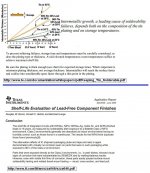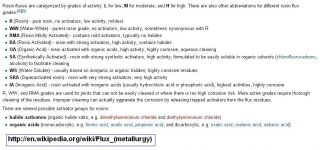I also loved JIT and SPC.
We used to call it "JTL."
Car companies are particularly enamored of this stuff, the good and bad, and love acronyms. I spend a good deal of my time assembling PPAPs and DFMEAs to no apparent effect other than letting the bureaucrat on the other end check off one of the mandatory boxes- I don't think anyone actually reads this things.
SPC, on the other hand, has worked really well for us and I'm a strong advocate.
We used to call it "JTL."
Car companies are particularly enamored of this stuff, the good and bad, and love acronyms. I spend a good deal of my time assembling PPAPs and DFMEAs to no apparent effect other than letting the bureaucrat on the other end check off one of the mandatory boxes- I don't think anyone actually reads this things.
SPC, on the other hand, has worked really well for us and I'm a strong advocate.
What does JTL stand for?
I recall Ford with their JIT line and the brake manu who had the fire and shut down all ford production for 2 weeks IIRC.
There are mandatory check boxes here as well, but it's the safety organization.
SPC is great when you're doing lots of widgits. For small quantity, it can get very difficult. For large quantities, it's great for PPM level product.
My boss tried to put spc on a product where we built and tested a 100 amp surface mount schottky in a 400 mil by 400 mil package about 100 mils thick. Testing 100 amp VF in a package that size was not consistent with SPC. The test was so orientation sensitive, the same batch of product could be tested 10 times, and 5 times it would come up out of control, 5 times it would be in.
jn
We used to call it "JTL."
Car companies are particularly enamored of this stuff, the good and bad, and love acronyms. I spend a good deal of my time assembling PPAPs and DFMEAs to no apparent effect other than letting the bureaucrat on the other end check off one of the mandatory boxes- I don't think anyone actually reads this things.
SPC, on the other hand, has worked really well for us and I'm a strong advocate.
We call them "TLA"s.
Yes, I don't disparage statistical process control either, and I'm thankful for what I learned about it. In the hands of experts it helps, particularly if they are not blindly fitting a Gaussian to get a number, but actually do look at the distributions.
What I did object to was the notion that knowledge was not only not necessary, but a detrimental condition. Then Taguchi gonna getcha. Some of Bob Pease's choice remarks, doubtless tempered for a PG rating were particularly apt, like the voltage regulator that worked better without crucial parts --- provided that you didn't need any line regulation!
I had an opportunity to embarrass the dictator once, while driving the soon-to-be COO and him and another guy back from a meeting. The discussion turned to the shift to class D amplifiers, one which the COO to be wondered why we weren't already pursuing. Well of course there had been significant development, particularly by the aforementioned other consultant, but he had told the dictator that certain parts had to be hand-inserted (the 'lytics in the bank of bulk caps) in a subwoofer amp design in order to achieve the needed electrical performance. The dictator's response was to put an explicit statement in the book of guidelines for manufacturing that class D amplifiers were prohibited. Period.
What I did object to was the notion that knowledge was not only not necessary, but a detrimental condition. Then Taguchi gonna getcha. Some of Bob Pease's choice remarks, doubtless tempered for a PG rating were particularly apt, like the voltage regulator that worked better without crucial parts --- provided that you didn't need any line regulation!
I had an opportunity to embarrass the dictator once, while driving the soon-to-be COO and him and another guy back from a meeting. The discussion turned to the shift to class D amplifiers, one which the COO to be wondered why we weren't already pursuing. Well of course there had been significant development, particularly by the aforementioned other consultant, but he had told the dictator that certain parts had to be hand-inserted (the 'lytics in the bank of bulk caps) in a subwoofer amp design in order to achieve the needed electrical performance. The dictator's response was to put an explicit statement in the book of guidelines for manufacturing that class D amplifiers were prohibited. Period.
Lean manufacturing methods fall into the categories you are all talking about. Where I was we were supposed to dispose of anything that had not been used in 6 months time. Storage area was considered more important than keeping something around that you could purchase a second time. My tooling department had guys literally having to hide items to keep them from being thrown out. One time we were doing refurbishment on some Apache rotor blade tooling and it was found that some of the original custom cutting tools used to manufacture the original tooling had been cleaned out by a previous Lean program. Turns out that the tooling had been paid for by the government and we didn't even own the tooling that had been disposed of. I don't know how they ever accounted for those losses, I wouldn't have wanted to explain that to the government inspectors that did periodic inspections for inventory control!
I have never had more political intrigue, than my 1+ years as a consultant for HK. I dealt with middle management almost exclusively, and who knows how they were hired to do their jobs?
OH, that's simple...when asked what type of animal they would describe themselves as, they obviously answered correctly..
Just Too Late.
Ah, yup....
jn
We own tooling on 5 continents for stuff we had made. Most of it is 5 to 10 tons, with machined accuracies to 15 microns over 4 meters. If we need a spare 5 years down the line, what are the chances the tooling will be there?Turns out that the tooling had been paid for by the government and we didn't even own the tooling that had been disposed of. !
zero.
And we paid for it, and contractually it is agreed that we own it and they will retain it...
Yah, wanna buy a bridge?
jn
To scrape or not to scrape?
George
That is the question...
strangely, your appnote, lower one, has a title including lead free as a descriptor, then includes tin/lead in the text..
8 years. I believe we can assume they used RMA flux in their wetting balance tests.
Mil spec requires R.
I can solder to the copper tin intermetallics if I get some plumbing paste from home depot...
But not if I'm stuck with R.
jn
JN,
Wouldn't that solder paste at the hardware store cause major problems? I use that for soldering copper pipe but I would think the acid would be very aggressive for electrical connections. How would you neutralize the acid content after soldering, sodium bicarb?
If you go back you will see that I stated "baking soda is your friend".
Some flux manu's sell neutralizing solution as well, if ya gotta go hi tek..
jn
I should have been clearer, my apologies. I stated baking soda about a thousand posts ago (probably yesterday given this thread), should have repeated it...
I really hate the active stuff, as cleaning off corrosives is not my preference.
But if ya have to use the active flux, it is very important to neutralize the residues and get rid of all of it.
jn
I really hate the active stuff, as cleaning off corrosives is not my preference.
But if ya have to use the active flux, it is very important to neutralize the residues and get rid of all of it.
jn
Last edited:
That is the question...
jn
As far as I understand, solderability problems start when tin on the plating is “exhausted”. This is dependent upon tin plating composition and thickness, component storage time and temperature.
How can I ever know all these when I buy components from a small retailer?
I can’t. But I can do a test. I solder the end of the component lead on a pcb. If solder flows well on the lead, tin is OK.
If it doesn’t flow, then I’ll have JC scrape the leads down to the copper.
Is this good enough Dirty Jneutron?
strangely, your appnote, lower one, has a title including lead free as a descriptor, then includes tin/lead in the text..
In all the papers I’ve read where lead free solder tests are reported, tin/lead (60/40) is always included as the “reference” solder.
George
For the record, about 25 years ago, we tried to 'streamline' the process of cleaning leads.
We investigated ultra sonic cleaners, fine sandpaper or emery paper, steel wool, and even powered sanders (from construction), and exotic chemical combinations from CAIG LABS, etc. but there were extreme tradeoffs in each approach. We finally went back to mechanical scraping, when we could.
We investigated ultra sonic cleaners, fine sandpaper or emery paper, steel wool, and even powered sanders (from construction), and exotic chemical combinations from CAIG LABS, etc. but there were extreme tradeoffs in each approach. We finally went back to mechanical scraping, when we could.
- Status
- Not open for further replies.
- Home
- Member Areas
- The Lounge
- John Curl's Blowtorch preamplifier part II

